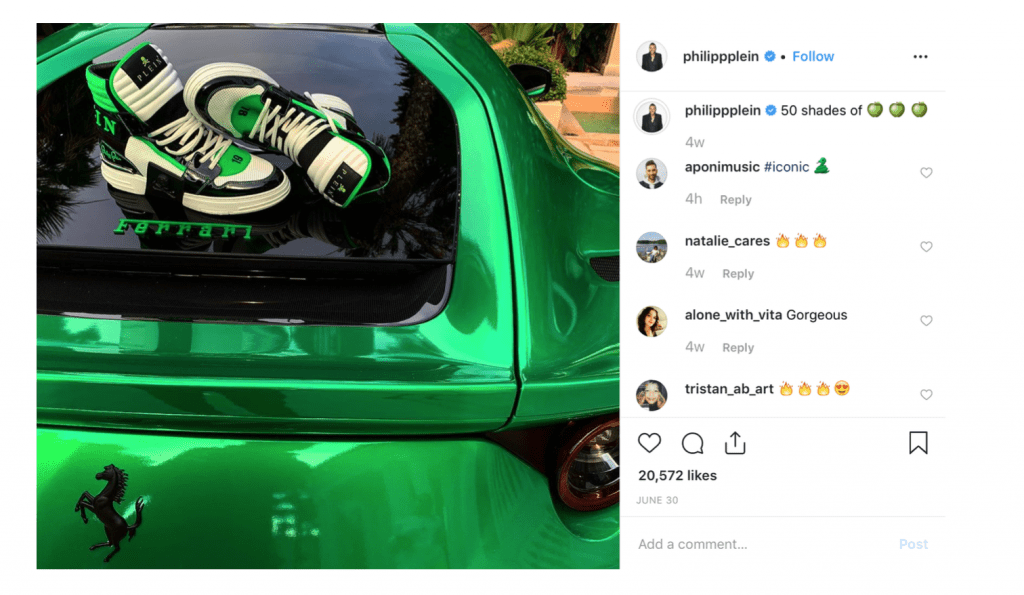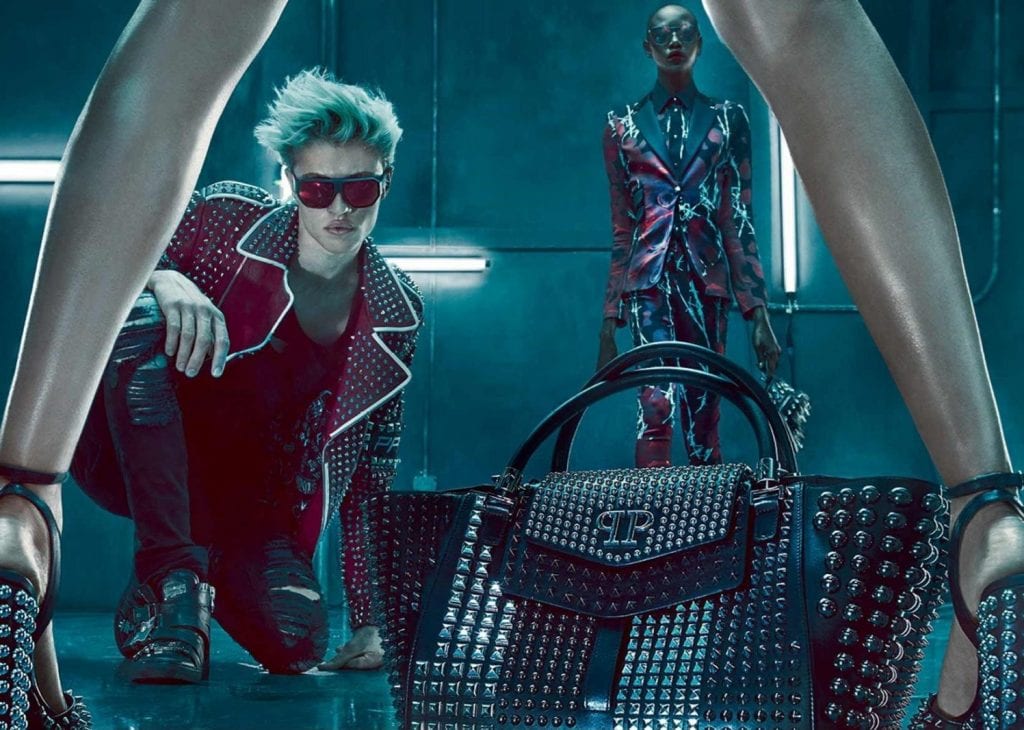This time last year, Philipp Plein shed light on a legal battle that was brewing behind the scenes. Taking a break from posting images documenting his glitzy real estate portfolio and eye-popping car collection, as well has his latest love interest and an assortment of branded garments and accessories from his eponymous label, which are all of the things that normally populate his highly-followed Instagram page, the oft-controversial German designer uploaded a photo of something else: a cease and desist letter from Ferrari with his name on it. In a strongly-worded caption, Plein accused the Italian automaker of blackmail.
In the July 2019 letter, legal counsel for Maranello, Italy-based Ferrari expressed its displeasure with Plein’s use of images of the company’s sportscars alongside products from his 15-year old fashion brand. The photos – the most critical of which featured a limited edition pair of Plein’s $800-plus PHANTOM KICK$ sneakers sitting atop of his $350,000-plus green Ferrari 812 Superfast – aim to create a connection between the two brands, according to the letter that Plein shared with his 2 million personal Instagram followers. The problem? That connection is “undesired” by Ferrari.
By featuring his products alongside Ferrari’s wildly famous trademarks, including the Ferrari name and prancing horse logo, Plein is using Ferrari’s legally-protected marks “for promotional purposes of [his] brand and products,” and thereby, “unlawfully appropriating the goodwill attached to them,” the automaker argued. As such, Ferrari’s counsel “formally ask[ed]” the designer to remove the images from his Instagram account.
If Plein did not remove the images at issue “no later than 48 hours from the receipt of this letter,” Ferrari informed him that it would bring such “unlawful, unfair and harmful behavior to the attention of the Courts.” Seemingly unphased by the threat of litigation, Plein responded to the letter on Instagram, calling Ferrari’s demands “clear blackmail” and vowing to initiate legal action of his own.
Following their respective threats, the parties did, in fact, end up in court, and in February, the Court of Genova in Italy sided with Ferrari, affirming – in an appeal – that the images and a corresponding video that Plein posted on Instagram do, in fact, run afoul of European Union and Italian trademark law. The problem for Plein, according to the court, is that such images, which feature his footwear “positioned on the body of a [Ferrari] car … may lead consumers to believe that Ferrari brand is in some way connected to [the Philipp Plein] brand” when no such affiliation exists.
This potential for consumer confusion is “reinforced,” according to the court, by the fact that the color of Plein’s products, namely, the green sneakers, is “almost the same” as the color of the car, which could prompt people to believe that there is “an association between the two companies and their products.”
The court was unpersuaded by Plein’s counsel’s earlier argument that the designer/influencer-of-sorts was well within his right to post the imagery featuring his cars, as the photos are not commercial in nature, but instead, a reflection of Plein’s lavish lifestyle. Addressing that assertion, the court recognized that the depiction of one’s personal life on social media will almost inevitably include his/her consumption habits, and therefore, will feature the distinctive signs of consumer goods brands.

However, the court held that “the use of third-parties’ trademarks by an influencer” (well-known fashion designers like Plein presumably fall within the court’s definition of “influencers”) is “considered lawful only when such use is authorized by the owner of the distinctive trademark, or when the images are descriptive of life scenes of the influencer or of third persons,” and are not merely being used for “commercial or advertising purposes.”
In Plein’s case, the court determined that the purpose of the photos and the designer’s use of Ferrari’s valuable trademarks in those photos is commercial. Taken together, the images – which depict the Plein-branded shoes on the the hood marked with the Ferrari logo – and the corresponding marketing messaging in the captions alerting consumers of where the shoes could be purchased “can only be explained as existing for the purpose of advertising” and bolstering the appeal of the Philipp Plein brand and its products by way of an association with Ferrari.
With that in mind, the court held that Plein’s use of Ferrari’s trademarks is unlawful. As for the corresponding video, which depicted bikini-clad women washing and dancing on the car with the sneakers readily in sight and with a caption that referenced the footwear, the court held that it demonstrated the “incompatibility” of the Ferrari and Plein brands, and that Plein’s use amounts of the Ferrari marks in such a way give rise to dilution of the Ferrari marks by tarnishment.
As of last month, with the case still underway, Plein took the matter to social media again, this time urging Ferrari to agree to settle the scuffle, and asserting that he was “exhausted and tired of fighting [with Ferrari] especially in this particular moment [when] it is completely inappropriate to fight over such unimportant issues!!!!”
In a June 5 letter addressed to Ferrari CEO Louis Camilleri, which Plein subsequently posted to his Instagram account, a representative for the designer called on the car company to “settle once and forever all the pending legal disputes and waive all claims and appeals in exchange for the commitment of Mr. Plein to donate in the name of Ferrari Group and Plein Group the sum of $200,000.” In connection with the letter, Plein stated that Ferrari had allegedly demanded $2 million from him in connection with the aforementioned trademark suit – a sum that Plein claims that he “negotiated” down to $200,000.
If Ferrari agreed to drop its claims and agree not to file suit at a later date, the letter – which was met with significant backlash on social media for seemingly using racial injustice as a lever to make the lawsuit go away – said Plein would make a donation to either the Official Gianna Floyd Fund, the Black Lives Matter Global Network Fund, the Black Vision Collective, or the NAACAP Legal Defense and Educational Fund.
Ferrari did not comment on Plein’s letter, nor does it appear to have settled the suit. “For the moment there are no further possible appeals in the injunctive phase,” Gianpaolo Todisco, an international and Italian corporate and IP attorney at Clovers in Milan, told TFL. “Ferrari could, however, begin the case on the merits in front of the Specialized Court and sue Plein” – who has removed the contested images and video from his account – “for damages.”
In terms of the takeaways of the case and the Court of Genova’s decision, one may be that “there is no bright line rule in terms of the use of third-parties’ trademarks” when it comes to influencers, according to Gowling WLG’s Kate Swaine and Dan Smith, particularly as influencers and the rise of social media have “contributed to the blurring between what is personal and what is commercial.” Against this background, “it can be especially challenging to make such a distinction when an individual’s posts a mix of personal and commercial content on the same social media account,” as is so often the case when it comes to influencers. As such, each instance will have to be analyzed on a case-by-cases basis.
Generally speaking, Swaine and Smith say that brands need to “consider their respective rights and obligations carefully and to be pragmatic,” as the wrong approach – or tone – could result in a costly and damaging PR nightmare. Moreover, influencers are encouraged to pay close attention when using others’ trademarks on social media, including “tagging brands they are not working with in order to increase their own profile and following,” as legal issues may arise if such posts have a likelihood of misleading consumers or damaging the brand at issue.
*The case is FERRARI Spa v. Philipp Plein International AG, 15049/2019 R.G.











